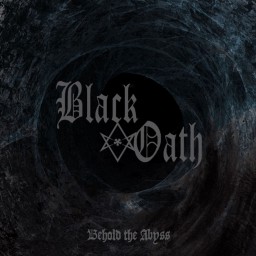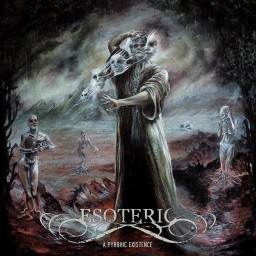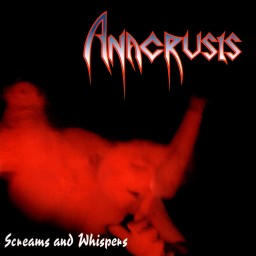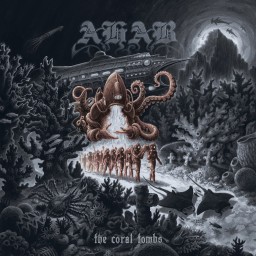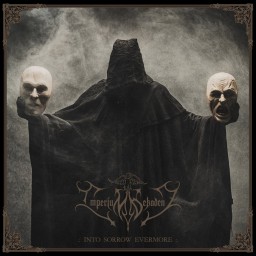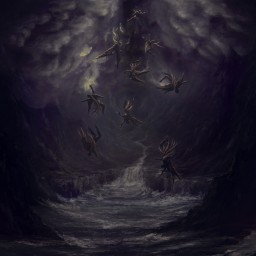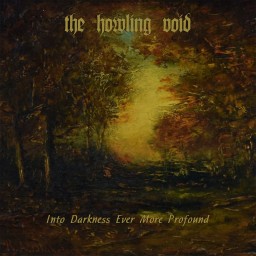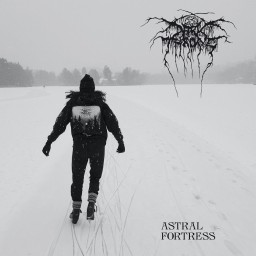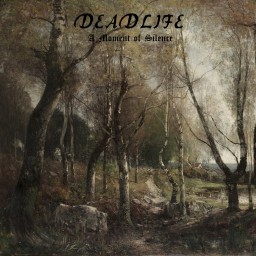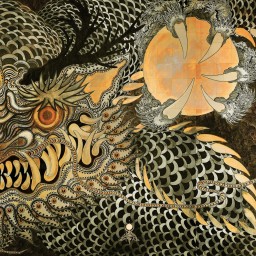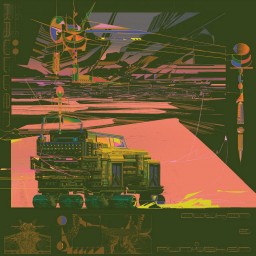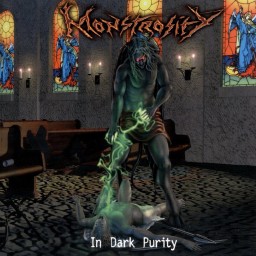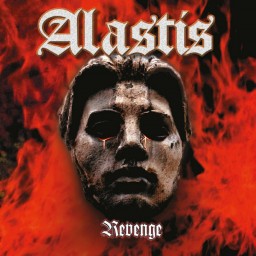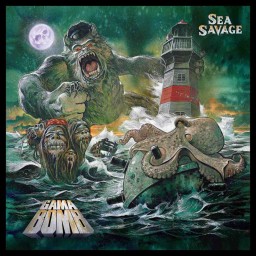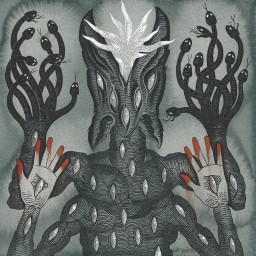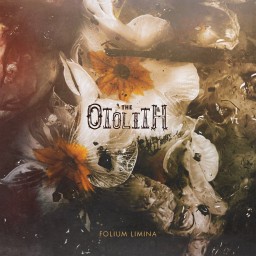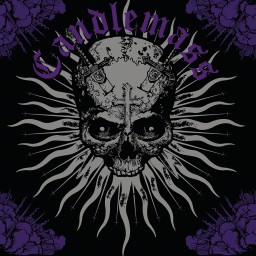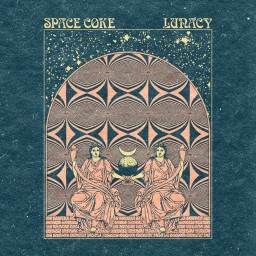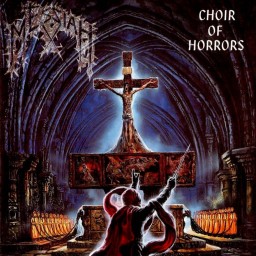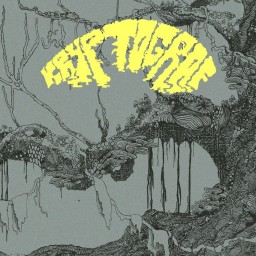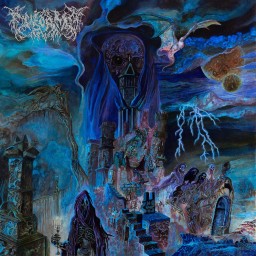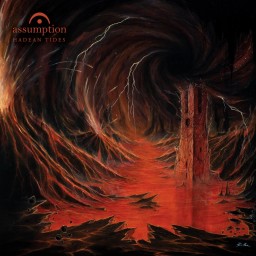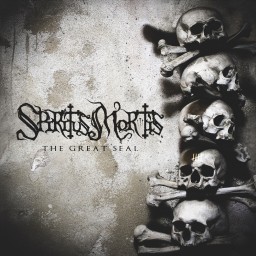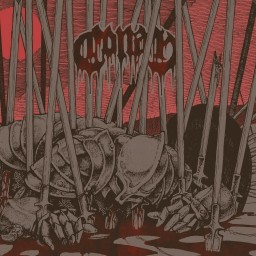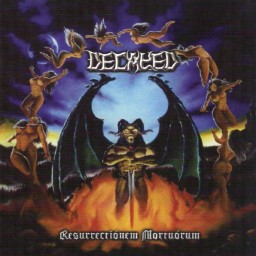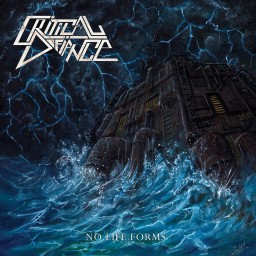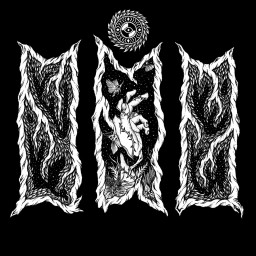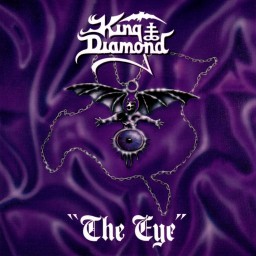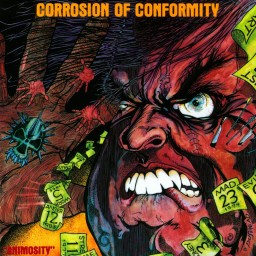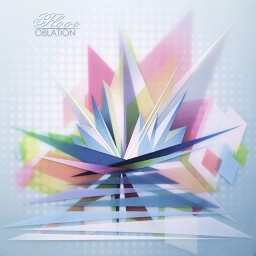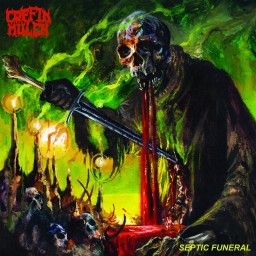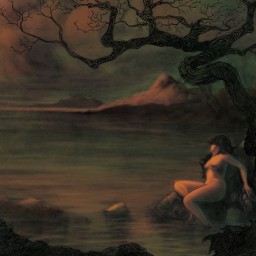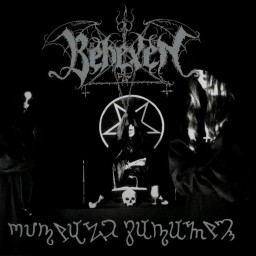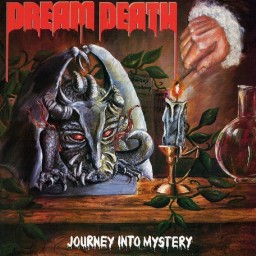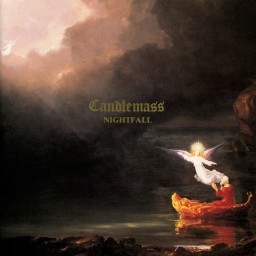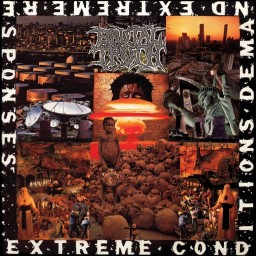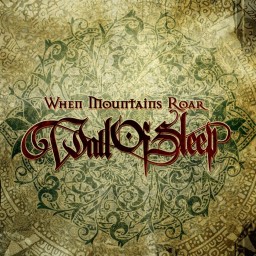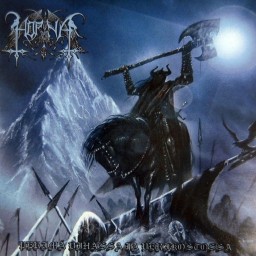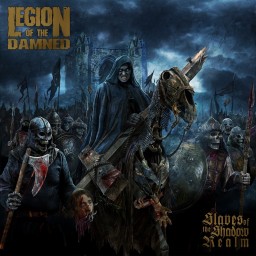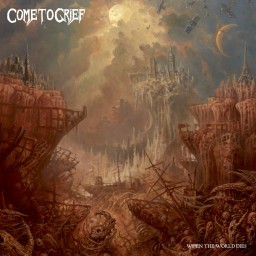Sonny's Reviews
had actually forgotten that I do have some previous history with Black Oath, having checked out their debut when it came out, back in 2011, and awarding it 4 out of 5 stars, so I must have found it to be pretty decent. The fact I couldn't remember it didn't bode well going into this review of their fourth album, Behold the Abyss, but I did my due diligence and revisited it with a real positive result as it is indeed a cracking slab of trad doom that any fan of said genre should dig. The years intevening between the debut and Behold the Abyss have seen their sound become more epic and here it sits somewhere between the out-and-out doom of Pallbearer and Monolord and the epic doom of, say, Solstice and Krux, with the inclusion of faster-paced sections and an increased number of guitar solos. On fourth track, Once Death Sang, they even introduce clean female vocals, in the vein of Shape of Despair et al, as provided by guest Elizabetta M, to even greater increase the epic atmosphere.
The album sounds great, with a real clarity that suits this more epic sound, the riffs boom out of the speakers and the solos sear through the listeners ear 'oles, while both bass and drums are functional without being overly showy, yet are suitably positioned in the mix and are clearly audible. Vocalist and bassist/guitarist, E.A. Zorath, whilst no Messiah Marcolin or Morris Ingram, possesses a voice that suits the material quite well and thankfully never resorts to embarrasing histrionics. The songs are well constructed and, whilst playing it quite safe within the doom/epic doom template, they come up with some terrific riffs and nice melodies - in fact tracks like Chants of Aradia and Lilith Black Moon are fairly catchy affairs.
Look, this is no envelope pusher, but if you dig on solid and satisfying epic doom fare, then you will be well served by Behold the Abyss. Also, it has reminded me of the debut's existence, which I have now boosted another half star, and which I personally prefer, but don't take my word for it, try them both out and see!
Genres: Doom Metal
Format: Album
Year: 2018
From the earliest days of the NWOBHM, through the 1980's thrash boom, the end of that decade's transition from thrash to death metal and into the nineties' black metal explosion, via bands like Venom, Slayer, Possessed, Morbid Angel and Darkthrone, metal had endeavoured to become more and more extreme by constantly striving to be faster and heavier (and more evil-sounding) than all that had gone before. Yet in the very early 1990's a small number of visionary metal bands, notably Switzerland's Mordor and Finland's Thergothon realised that true extremity lay in slowing things down to a snail's pace, utilising huge, crushing chords that seemed to last aeons, employing vocalists who barely registered on the human vocal scale and placing huge emphasis on repetition and a funeral-like atmosphere. One of the first funeral doom acts to form in the wake of demos from Thergothon and Mordor and to completely embrace the funeral doom aesthetic were Birmingham's Esoteric. That was back in 1992 and it is a testament to the band's quality that they still sit at the apex of the genre thirty years later.
I would have to peg Esoteric as one of my top five metal bands of all time. They are one of those metal acts who just refuse to compromise. When I say this, I don't mean to say that their sound hasn't evolved, but rather that, despite fundamentally playing funeral doom for the entirety of their thirty year career, unlike other long- established bands who started out playing this most mournful of metal genres, they haven't forsaken the style completely by moving in an entirely different direction. Over recent years they have certainly incorporated elements of post-metal into their sound and they have always been a more than a mere funeral doom band, but they are still unashamedly committed to the genre and their commitment to it has made them, arguably (well, for me, inarguably), the premier exponents of the style.
Having released only seven full-lengths in their thirty years, aptly for a funeral doom act, they are not a band to be hurried and A Pyrrhic Existence was their first new release in eight years, as Greg Chandler had been concentrating on his avant-garde black metal project, Lychgate, so anticipation for the album was high. Of course, Esoteric didn't disappoint and if they never release another album then A Pyrrhic Existence will stand as a fitting swansong for the UK's best extreme doom metal act.
A Pyrrhic Existence, in common with several of the band's previous full-lengths, is a long album, although at 98 minutes it's about an hour shorter than your average Marvel Universe movie and is a million times more rewarding (although it does have less throw-away one-liners and spandex, that much is true)! It is an album that is heavily predicated on atmosphere. To this end, Esoteric also incorporate elements of post-metal into their sound that fans of Cult of Luna or Neurosis may instantly feel at home with and that, along with the lightness and airiness of the lead guitar work, when combined with the immense, seismic chords and Greg Chandler's harrowing vocals, presents a huge contrast of light and dark that sits at the heart of what A Pyrrhic Existence is about. Opening track, Descent, is one of my favourite metal tracks of all-time and delivers an unrivalled atmosphere to match it's title, as it genuinely feels in places as if the listener is falling earthward as if from a great height, which kind of epitomises the light/heavy dichotomy into a truly compelling atmosphere. I have rarely felt so utterly consumed by a track as I do every time I listen to this modern metal classic, a track that is genuinely breathtaking (almost literally, not merely metaphorically).
Greg Chandler's vocals really are something to behold. He alternates between a deep growling that sounds like boulders splitting under the pressure from some huge subterranean force and a ragged shriek born of black metal, the overall effect of which sounds like some sort of primal demon that has been possessed by another, even more deranged, demon. For my money Chandler is one of the very finest extreme metal vocalists and for him to still be able to produce such an extreme vocal performance after so long in the game is impressive. This is also a ridiculously heavy album, even though it has those contrasting lighter sections, it is still crushing when it needs to be. There are occasional daliiances with chugging death doom riffs and in the middle of the track Culmination they employ a riff that sounds like they took the intro to Am I Evil?, brutalised it, then supercharged it and made it their own. Drums have (often justifiably) gained a reputation of monotony in funeral doom, but the performance of drummer Joe Fletcher is powerful and precise and is another element that elevates A Pyrrhic Existence above it's peers.
For me this is the epitome of modern extreme metal, particularly from the viewpoint of an old doomhead, but as with any extreme form of metal, it doesn't provide an instant high and it certainly isn't for everyone, but it is one of those sublime albums in which it is possible to lose oneself and especially using headphones it is like I imagine it would be to be immersed in a sensory deprivation chamber. For those open to it's charms, this is likely to be a thoroughly rewarding experience if you have the patience.
Genres: Doom Metal
Format: Album
Year: 2019
I haven't paid much attention to Anacrusis over the years and so I wasn't quite sure what I would be getting with Screams and Whispers. Well one thing I did get was an interesting listen that's for sure. This is definitely not one of those thrash albums that jumps out and grabs you by the throat, it requires a degree of investment on the part of the listener in order to unpack and digest what is going on here. Thrash metal can often be a very immediate experience, but a single, or even a couple of listens would never do an album like this justice. It is true that by the time of Screams and Whispers release there were several bands trying to move thrash metal on into a more progressive or technical direction, with varying degrees of success and it's fair to include Anacrusis amongst their number.
One thing that did stand out immediately were Kenn Nardi's vocals which don't come on like most other thrash vocalists who try terribly hard to sound as aggressive as possible, although he certainly shows at times he is capable of vocal aggression, it is not his only recourse. There is a gothic tinge to his vocals and even, I might venture, a touch of grunge about his singing. Most often, he comes off as a cross between Suicidal Tendencies' Mike Muir and Killing Joke's Jaz Coleman, although he can let rip when the material requires it.
Musically Screams and Whispers is a real mixed bag and to call it simply a thrash album is not telling the whole story. I guess progressive metal may cover it, but there really is a shedload of different influences going on here and from track to track, like with Forrest Gump's proverbial box of chocolates, you're never quite sure what you're going to get. Anacrusis seem to take delight in catching their listeners off-guard with a succession of curveballs, whether it's a gothic metal-like track such as the opener, Sound the Alarm (probably my favourite track), or the accessible melodies of tracks like Release that are exceedingly catchy in places, to the keyboard flourishes that sound like they were rented from Yes' Owner of A Lonely Heart that rear their heads on more than a couple of occasions, and the Killing Joke-influenced Division, this is certainly an unpredictable thrash metal release.
But, does it work? Well, I am a man of simple tastes and it could be that this is just too cosmopolitan for me but, no I'm afraid it doesn't always work and on a few occasions the constant change of direction hints at a work that doesn't really know what it wants to be, other than different from the herd. The constant and sudden changes of direction I often found frustrating and a little bit irritating, with it ultimately residing slightly outside my enjoyment zone. Don't get me wrong, there are tracks I enjoyed, the aforementioned Sound the Alarm and Division for example, but for me it isn't sufficiently coherent and those constant curveballs ended up distracting more than engaging me. What does make this album for me and are what I will take away from it are Nardi's vocals which lift the album higher in my regard than I think it would have with an inferior singer, so although I found the whole a bit disappointing, the vocals made it a worthwhile experience nonetheless.
Genres: Progressive Metal Thrash Metal
Format: Album
Year: 1993
German doom metal titans Ahab are back with their fifth full-length, eight years since previous album, The Boats of the Glen Carrig, hit the shelves. In common with all their previous releases, The Coral Tombs is a concept album based on a nautical-themed literary source. This time the aquatic source material is Jules Verne's classic science fiction novel Twenty Thousand Leagues Under the Seas. Ever since their debut, The Call of the Wretched Sea, with each successive release Ahab have been steadily moving further away from their funeral doom beginnings and on The Coral Tombs, as with Glen Carrig, the band have adopted more of a straight-up doom metal sound similar to the likes of Monolord and Pallbearer, although the real touchstone here is Warning's classic Watching From A Distance, with both Daniel Droste's vocal and guitar phrasing sounding heavily influenced by Patrick Walker on that all-time classic - and anyone who knows anything about my musical preference knows that that will instantly grab my attention!
This doesn't mean that Ahab have abandoned extreme doom metal completely of course and there are several well-placed death doom moments when Droste's guttering growls replace his melancholy cleans and the riffs start their deathly chugging, though usually they are used now as a counterpoint to the mournful sadness of the cleaner sections, such as on Colossus of the Liquid Graves. During a track like this Ahab strike me as a death doom Opeth with the band sounding like they also want to push their progressive credentials a bit. I think Opeth is a fair comparison as I always considered the Swede's to be technically one of the best bands in their field and I think the same is true of Ahab, their instrumental skills and songwriting ability seem to be well in the upper echelons of the doom metal fratenity.
Over the course of their five albums Ahab have done a sterling job of capturing the feeling of being adrift on (or under in this case) the vast and uncompromising oceans of the world, with a loneliness and lack of control over one's destiny that is tangible within the notes of the band's music. This adroitness in so successfully creating such an oppressive, and yet at the same time beautiful, atmosphere is the mark of fantastic songwriters. There are times during The Coral Tombs when you can just picture the Nautilus sailing over breathtaking subterranean vistas, it's crew utterly entranced by the strange beauty of the previously unwitnessed ocean depths, so successfully do the band create these narrative pictures. One of the standout tracks for me is The Sea as a Desert where the band still exhibit some of their funeral doom tendencies, but ally this with a soul-wrenching mournfulness when Droste's cleans sound most like Patrick Walker and make the hairs stand up on the back of my neck!
There are a couple of guest vocal appearances on the opening and closing tracks - Chris Dark of Ultha adds his black metal shrieks to Droste's gutteral utterings on the explosive opening moments of Prof. Arronax' Descent Into the Vast Oceans (which then actually slows to a much more sedate and gentler atmosphere) and Esoteric's Greg Chandler helps out on The Mælstrom with his trademark growls. Neither guest slot is gratuitous and both bring something that Droste obviously felt he couldn't manage alone, but that the music required. So yet again Ahab prove that they are a top-drawer doom metal act, not restricting themselves, but rather drawing on several of it's sub-genres to enable a more expansive and rewarding experience for the listener whilst still presenting an unarguably doom metal release that is both haunting and crushing.
Genres: Doom Metal
Format: Album
Year: 2023
At one point I found myself over-saturated with black metal and consequently for the last year or so I have paid it very little attention, other than for a few releases from acts I was already familiar with. So to a new year and I feel ready to put black metal back on the menu and as fate would have it, the first release to cross my path was the new album from German atmospheric black metal duo, Imperium Dekadenz. My only previous contact with the band was via 2007's Dämmerung der Szenarien album which I found to be a solid, if not especially earth-shattering, effort, so it has been a while since I paid the band heed.
Well, even after a solitary playthrough, Into Sorrow Evermore had a firm hold on my attention as it was immediately apparent that this was a cut above your run-of-the-mill atmospheric black metal release and was one that demanded further scrutiny. Most of the tracks here tread a line between atmospheric and uptempo melodic black metal, erring more on one side or the other depending on the track and are atmospherically epic and expansive. There is plenty of variety, though, with a couple of tracks that have a slower tempo and a greater emphasis on post-metal-derived melancholy, almost channelling a doom metal sensibility, in the vein of the stuff someone like Deha produces on a regular basis. The riffs are great with a fairly meaty sound for black metal, with each being sufficiently melodic and memorable that they live long in the memory, a trick too many atmo-black bands are unable to replicate. Vocalist Horaz has a great line in washed-out shrieking that fits the blasting and riffing perfectly and it is always great to hear real drums on an atmo-black album, they just give it a natural authenticity that programmed drums are unable to reproduce convincingly.
Thematically the album is on solid ground, the lyrics comprising a philosophical contemplation of the implacable majesty of the natural world and Man's place within it, a subject any atmospheric black metal fan will be extremely familiar with. There is no compulsion on the part of the duo to push boundaries and you won't be overwhelmed with layers of dissonance or overly complex rhythms and song structures, but Into Sorrow Evermore bears the hallmarks of a band who have been honing their craft and songwriting skills within their own field of expertise and if you are a fan of classy, natural-themed atmo-black in the nature of Wolves in the Throne Room you will find much here to revel in. For me, Imperial Dekadenz have definitely given me a big push to climb back aboard the black metal express and for that I am extremely grateful.
Genres: Black Metal
Format: Album
Year: 2023
It has been over eight years since the unholy Hellenic duo, Thy Darkened Shade, released the first part of their "Satanic Book", Khem Sedjet, but finally they are back with the second volume, entitled Mahapralaya. This latest instalment is an interesting combination of the accessible and the dissonant that has a distinctive Greek flavour and a progressiveness that gives the whole a narrative feel, as if the band are regaling us with an epic tale of satanic adventure. The songwriting is key to this feeling of progression through a narrative as it's complex and interesting structure leads us organically from one chapter of infernal doings to another.
Whilst there is a degree of technical dissonance employed throughout, the band are unafraid to resort to melodic passages and riffs, reminiscent of the recent, more accessible side of Deathspell Omega and symphonic flourishes to add a sweeping epic quality to the album. Personally, I find this more palatable than out and out dissonant black as I often find myself overwhelmed by that form of black metal and I find it difficult to fully absorb what is going on, but here I think TDS have struck a superb balance between the melodic and the dissonant which makes the experience much less alienating, although whether that is a good or bad thing depends on how unforgiving you like your black metal to sound.
Technically, the band sound excellent and with crystal clear riffs this is no raw as fuck demo-quality blaster. Drums are provided by guest musician, Hannes Grossmann, who is the current drummer with Triptykon and who provides a precision and skill that only enhaces the already impressive musical endeavours of multi-indtrumentalist Semjaza. Vocally there is plenty going on, from all-out black metal barks to almost spoken-word snarls and and on to choral flourishes that further expand the sound into more epic territory without ever sounding overdone or cheesy.
Overall, I found this to be a compelling listen with just the right level (for me) of dissonance to keep it from feeling too "cosy" without it tipping over into wilful angularity and there are sufficient hooks to allow it to remain in the memory after the disc has stopped spinning. The progressive songwriting leaves no possibility of boredom setting in as repetition is not an issue with Mahapralaya, yet it remains well-structured and coherent. I haven't been paying much attention to newer black metal over recent months, but with Thy Darkened Shade's latest my attention has been firmly attracted.
Genres: Black Metal
Format: Album
Year: 2023
The Howling Void is a funeral doom metal solo project and is the brainchild of Ryan Wilson, who is a member of many other projects, including the underrated funeral doom duo, Excantation, veteran grindcore band Intestinal Disgorge and black metallers Endless Disease, to name just a few. I have been somewhat of a fan since 2013's Nightfall album but whilst the four albums prior to this are solid slabs of mournfulness, I have never exactly considered The Howling Void to be an upper echelon funeral doom outfit. This isn't about to change any of that, but it is possibly my favourite release of his to date, although I have still to check out his more highly rated first three albums.
The four tracks crawl along at a snail's pace, but don't possess the crushing heaviness of an Esoteric, rather their mournfulness is expressed in a more wistful and reflective way than the often desperate-sounding and world-shaking grief of the genre's premier exponents. This is not a criticism, per se, there is definitely room in the funeral doom world for lighter and less crushing version and it gives a different perspective on the style that may appeal to those put off by the unremitting weight that they may otherwise be confronted with. I have said it before and it bears saying again, I feel there is a correlation between this lighter form of funeral doom and atmospheric black metal where both use very different means to achieve a similar airiness of atmosphere. Third track, Deeper, Darker Waters, even employs a tremolo picking technique reminiscent of atmo-black at various points, whilst retaining the plodding funereal drumbeats.
There is liberal use of keyboards, yet thankfully without overdoing it and straying into symphonic metal territory and theguitar work possesses a reasonably melodic quality. The vocals are servicable, although I prefer them a bit deeper and gruffer myself, but they feel a little buried in the mix at times and I find I really have to concentrate for them to register sufficiently. So, essentially a good album with some nice atmospheric touches that doesn't, for me, quite deliver the soul-crushing weight I love from my funeral doom, but is still nonetheless a reasonably satisfying listen and represents a different side of the genre that certainly has it's place.
Genres: Doom Metal
Format: Album
Year: 2023
If I was backed into a corner and was forced to choose my favourite metal band, then I would probably choose Darkthrone. Not just because of their classic black metal albums (although that is reason enough), but also because of their obvious passion for and love of metal that I too share, their absolute refusal to compromise in their musical endeavours and their lack of concern as to how they or their music are perceived by the outside world. Let's face it, how many metal bands would dare even think of putting out an album with a cover that is merely a photograph of the drummer ice skating?
So, anyway, Fenriz and Nocturno Culto return with their 20th studio album and continue with their crusty, blackened take on doom and heavy metal that came to the fore on previous release, Eternal Hails. This one is a take on late-80's, early-90's underground trad doom fed through a blackened crust filter, but updated with better production and, in truth, it differs very little from it's predecessor to the extent that they could both have been released together as a double album and no one would have batted an eyelid. I know most metalheads now want to shit on Fenris and Nocturno for not endlessly recycling A Blaze In the Northern Sky, but this is what they do now. Is it as good as their 90's stuff? Well obviously not, but I quite enjoy this tiny niche that the duo have carved out for themselves and their more recent material is kind of quaint in it's lack of pretension and total disregard for trends or adherence to the zeitgeist. For those who know of it, Fenris and Nocturno Culto kind of remind me of Lance and Andy from the BBC show Detectorists with their dogged refusal to be affected by the world at large and their almost idealistic existence in their own little corner of the globe.
Where I feel Darkthrone succeed most, is in their ability to gradually reshape their music in directions that interest them whilst still embracing a unifying "sound", as in the blackened crust that still forms the backbone of what they are about, whatever other genre thay may be focussing on otherwise. This continuity gives us diehard fans a way into whatever it is they are doing and with it comes a kind of surety as to what you are going to get. Darkthrone seem uninterested in suddenly changing direction for the sake of it and are unlikely to throw out too many jarring curveballs to their audience. Of course, this is much to the chagrin of a lot of the online metal community, whose almost ADHD-like desire for continuous change and intellectual challenge (from albums the majority will only listen to once or twice) makes a band like Darkthrone anathema to them and attracts huge amounts of criticism as the keyboard warriors vent their spleen against the duo. But of course by then, Fenriz is off skating up some frozen fjord and couldn't give two fucks what some music know-all from gods-know-where has to say about it!
Astral Fortress start out very strongly with Caravan of Broken Ghosts which has a great crusty trad doom main riff that gets even better when the duo put their pedal to the metal on the speeded up section that used to be one of the staples of trad doom, the track as a whole coming off as a necroticised version of Pentagram or early Saint Vitus. I think Nocturno and Fenriz take their feet off the gas a little on the next couple of tracks, Impeccable Caverns of Satan and Stalagmite Necklace. They are decent enough and I really like the main black 'n' roll riff of the former, but they lack dynamism and start to drag the album down a bit, sounding as they do like outtakes from Celtic Frost's Morbid Tales that didn't make the cut. So, despite side one tailing off to some extent, side two is a much more convincing experience. Kicking off with the bizarrely named The Sea Beneath the Seas of the Sea, the track itself is bookended by an intro and outro that sound a bit like very early (circa Fly By Night) Rush - believe it or not! The track as a whole is Darkthrone's own particular take on a ten minute trad doom epic that sounds like it's been dug up after thirty or forty years of decay. Next up, Kervorkian Times is my favourite track on the album with a killer main riff and Nocturno Culto spitting fire and bile, proving that even in their fifties these guys are still underground metal legends. A short instrumental and we're into final track Eon 2, which doesn't on the face of it have anything to do with the instrumental Eon off of Soulside Journey, but which does contain a Maiden-esque galloping riff before it settle back into the doom-pacing of the rest of the album.
Nocturno Culto's vocals are undiminished by time and he still fires out riffs left, right and centre and Fenriz is a complete legend so, to me, the world is a much better place with a band like Darkthrone and their love of metal and refusal to compromise still in it. So what I'm trying to say is "fuck the haters".
Genres: Black Metal Doom Metal Heavy Metal
Format: Album
Year: 2022
Deadlife is one of the many projects of Rafn (aka Anders Nord) who also plys his trade as Hermóðr and Mist amongst others. He is a prolific releaser of material, with 21 EPs and albums as Deadlife since 2018 alone. A Moment of Silence is a single track lasting 17 minutes that mixes some of the atmospheric black metal of Rafn's other projects with Deadlife's DSBM for a melancholy, yet hypnotic release that won't exactly cause much of a stir, but which is actually quite a nice piece of gently morose black metal. It doesn't do anything fancy, but it's fairly minimalist approach and uncomplicated arrangement is quietly reflective and actually quite a calming experience. There's not much more to say really, other than I enjoyed it and actually like it more than his work as Hermóðr.
Genres: Black Metal
Format: EP
Year: 2019
Set Chaos to the Heart of the Moon is the Roadburn set performed by the Belgian psych/drone/jazz collective on 17th April 2021. Starting off with Sustain, I guess you had to be there to appreciate the track as it is a bit of a nothingness really, it's random and disparate vocalisations don't do much for me in this recorded form and does very little to build any anticipation for the hour plus that is to follow, although I can see how it may be considerably more effective (and possibly disturbing) in a live setting. Those opening eight and a half minutes are followed by Zâr: Empowering the Phurba: Éon Phanérozoïque which is where the bass and percussion introduce themselves as the driving force behind the piece with the rest of the band doing all their "twiddly bits" over the top of this propulsive force which seems to gain monentum and power as the track proceeds.
The five-part, twenty-seven minute suite, Vajrabhairava is up next, starting with it's heavily eastern-influenced, shamanic atmosphere it is the most interesting part of the set for me and marks the point, quarter of an hour in, where the album finally gets going properly. The psychedelic jazz presented during Vajrabhairava is very hypnotic, in particular The Great Wars of Quaternary Era Against Ego, which comes off like a jazz version of a Hawkwind jam from their seminal Space Ritual live album and I have found myself zoning out more than once whilst listening to it, thoughts off and away elsewhere, pondering the nature of time, space and reality, such is the effect of this sonic mindwipe on my neural pathways! The final twenty-plus minutes are dedicated to another lengthy suite, the three parter, The Conference of the Stars which once more has at it's centrepiece, after a sax-led crawling first movement, a glorious jazzy space-rock jam that is dynamic and propulsive, as if hurtling between astronomical bodies on a tail of fire, which marks another high point of the album for me. The performance sounds impeccable, and it is evident that NM are consummate musicians who are technically excellent and who gel together impressively in a live environment.
Overall, this is an album that gets off to a slow start and begins to test my patience early on, but which redeems itself with some quite sublime, psychedelic-laced musical adventures to places few others dare to tread. I get a similar sensation from this as from another Roadburn set, Waste of Space Orchestra's Syntheosis, which isn't musically the same, but is certainly spiritually so. For all the plaudits for the droning avant-jazz, it is the kineticism of The Great Wars of Quaternary Era Against Ego and The Conference of the Stars Part Two: the Ascension that really grabs me, their dynamism providing more focus and direction than the sometimes (to me) aimlessness of the most avant-jazz sections. I can imagine this was a brilliant live experience and I am sure that a Neptunian Maximalism performance is indeed something to behold, with the recorded version probably lacking a bit of the x-factor you sometimes get with the best live acts. When it is good, it is absolutely superb, but there are a couple of sections I could do without if I am being honest (as in the first fifteen minutes) and so I can't award it my very highest scores.
Genres: Drone Metal
Format: Live
Year: 2022
Krüller is the first release I have heard from Author & Punisher and so I have no idea of the project's development arc throughout it's existence up to that point, other than what I have gleaned from other reviewers, who all seem to agree that this is an artist who is always improving. Well, Krüller certainly seems like a very polished and well put-together album for a solo industrial artist - I must admit I was dreading some kind of avant-garde noisescape that would send my head into a spin, but this is nothing of the sort. Most of the songs are far more melodic than I would have expected with the industrial effects being used to add a layer of atmosphere that is very effectively handled in the main. I personally can't hear where the drone metal element the tagging suggests is to be found as the majority of the tracks, when stripped back, contain very little drone. I would suggest the majority of the tracks have their roots in darkwave and gothic or alternative metal with the use of the industrial toolbox adding a hardness and alienation to the sound that may give the impression of a more extreme form of metal than is actually present here. Whilst this approach is by and large successful, it sometimes falls short, particularly on Blacksmith where it sounds to me like two different tracks are playing separately, a Swallow the Sun-like gothic lament and a Prodigy-inspired industrial dance track, the two not gelling together at all and just coming off like a complete mess to me and, after a couple of playthroughs, it has me reaching for the skip button at this point. Luckily Blacksmith is followed by the title track that rounds off the album and this is my favourite of those on offer, feeling like a heartfelt cry from the soul with the industrialised pounding adding to the melancholy atmosphere.
One aspect I haven't seen much around the discussion of this album is exactly how good a vocalist Tristan Shone is. I found his singing to be quite affecting at times and it's generally melancholy tone acts as a perfect counterpoint to the almost ever-present industrial pounding, serving to emphasise the humanity of his voice which, I would suggest, is the true heart of the album. The inclusion of a cover of the fantastic Glorybox by Portishead strengthens this claim, I think, and reinforces the impression of humanity's small daily triumphs in the face of an industrialised hegemony.
Generally speaking, I found this to be an interesting and surprisingly emotional album. I think there is far more to it than the obvious "gimmick" and although it is not always completely successful to my ears, I am glad it exists and I can hear why it has gained so many advocates over the past few months, even if I may not be the most ardent of them. Author & Punisher is definitely an artist whose future releases I will look out for to see how his sound develops moving forward. Love the cover art, by the way - very 1970's sci-fi.
Genres: Drone Metal Industrial Metal
Format: Album
Year: 2022
Unsurprisingly, given my rudimentary knowledge of death metal, I have never heard of Floridians Monstrosity before, despite their thirty-plus years existence within the Floridian death metal scene. I have since found out that they were the original home of Cannibal Corpse vocalist George "Corpsegrinder" Fisher who left Monstrosity after their second album, Millennium, to join CC. For In Dark Purity, Monstrosity's third full-length, the band recruited new vocalist Jason Avery who, on the strength of this, seems like a more than capable replacement for "Corpsegrinder" and I must confess that I like this more than any Cannibal Corpse album that I have heard (which, believe it or not, is most of them).
The band are really tight and the riffs are thick and chunky with Avery vomiting out the lyrics with imperious contempt. This is exactly how I like death metal to sound, hard as fucking nails with a good degree of competence, but without being overly technical or showy. I struggle sometimes with death metal albums where all the tracks sound very similar, but on In Dark Purity each track is very well defined and there is plenty of variety on offer without straying too far beyond what makes the band's blistering approach so great. The solos are quite varied too and are fairly dynamic sounding, but with a kind of old-school metal aspect to them rather than just a short burst of squealing every time a solo is required! Even the cover of Slayer's Angel of Death that closes out the album, although superfluous, is as well done as anyone could expect from a band that isn't Slayer.
This is one of the most mature-sounding death metal albums I have ever heard - even with the song titles the band refuse to resort to the cartoonish or ridiculous. For my money In Dark Purity must be one of the best-kept secrets of late-nineties death metal and is an album that I will definitely be seeking out for purchase. Pity the cover art is so awful, though.
Genres: Death Metal
Format: Album
Year: 1999
Alastis are not a name that has crossed my path before and they don't seem like a band who have made much of an impact on the metal world with no ratings here at Metal Academy for any of their albums and 120 the most for any of them on RYM. They formed in 1987 as Fourth Reich, but changed their name to Alastis in 1989, originally playing black metal and releasing five full-lengths before splitting in 2004. Revenge is the fourth of these albums and was released in 1998. The album is tagged as black, gothic and doom metal, but I hear very little doom metal here and the black metal is pretty much restricted to War D.'s rasping vocal delivery. Metal Archives has it tagged as extreme gothic metal and I would go along with that as a better descriptor.
Apart from the harsh vocals which are a change from most of the gothic metal I have heard previously, this is a fairly unremarkable album. It isn't terrible by any means and I have listened to it three times without any great hardship, but it just sounds like a fairly middle-of-the-road rehash of Paradise Lost style gothic metal with medium paced riffs and overlaid keyboards but without Nick Holmes' charismatic singing. The performances seem fine and all the songwriting elements are in the right place, but the whole is lacking any kind of spark and comes across as being purely functional. Once it has gone from my speakers it has also gone from my mind. I often see the "kids" describing stuff as "mid" on the RYM boards and I have never really got what they mean before - but now I think I do. Don't get me wrong, I'm not hating on this at all, but I can't think of any reason to go back to it when there are so many other things to listen to.
Genres: Black Metal Doom Metal Gothic Metal
Format: Album
Year: 1998
I haven't listened to Gama Bomb since 2008's Citizen Brain album, which I bought at the time, but haven't spun a whole lot since as, to be honest, it didn't do much for me (I will have to revisit it though after this). Gama Bomb write short, breakneck, often humourous, thrash metal that makes no attempt to break new ground and I have no problem with that. Of the twelve tracks on Sea Savage, the longest is four and a half minutes with half the album's songs clocking in at under three minutes and, I must admit, the band in full flow do thrash fucking hard. The tongue-in-cheek humour that is employed throughout isn't especially jarring and doesn't detract from the music at all - and let's be honest here, thrash metal, lyrically, can often be ridiculous even when played straight-up.
No, by far my biggest bugbear with Sea Savage is regarding the vocals. Mostly they are fine, but way too often vocalist Philly Byrne resorts to a ridiculous falsetto that feels like it may be a parody of Painkiller-era Rob Halford and I hate it. It occurs at some point in nearly every track and totally ruins them for me. It's use is most prevalent on the title track and it makes that track virtually unlistenable to my ears.
Despite this quite substantial misgiving, I still have to give the album a 3.5/5 because, as I said earlier, it does thrash so fucking hard and at it's best it is quite infectious, but that damn scream is just so fucking annoying that I can't ignore it and must reflect it in the score.
Genres: Speed Metal Thrash Metal
Format: Album
Year: 2020
Leviathan is a solo project of Wrest (Jef Whitehead) who also releases albums as Lurker of Chalice. He is one of those artists I have heard of, but listened to, very little. In fact, Scar Sighted is the only album of his that I have heard previously, back when it was released in 2015 and in all honesty it didn't do a whole lot for me back then, so it's probably time for a re-evaluation. This is actually quite dense stuff as, after a short intro, we dive straight into The Smoke of Their Torment which feels like Deathspell Omega playing tech death. There is a significant death metal element present on quite a bit of the Scar Sighted, which gives it a thicker and beefier sound than you might normally get on a typical black metal album. Third track, Dawn Vibration, again features a beefed-up, but quite dissonant vision and you start, at this point, to feel that Wrest is probably working through some internal issues. Lucky is he to have the ability to utilise art to express his inner torments, because if these disturbing soundscapes had no outlet then heaven's knows where their creator would be, mentally speaking. A lot of the lyrics are as dense as the music, but a line from Gardens of Coprolite seems quite telling, "All of us have become like one who is unclean, and all our righteous acts are like filthy rags; we all shrivel up and like the wind our sins sweep us away" - not exactly the thoughts of one who is comfortable with their lot or who has a positive view of society as a whole!
I think I generally got more out of Scar Sighted this time round than previously, perhaps with more of an insight into it's creator, or maybe because I have become more open to dissonance than previously, although I can still only really take it in small doses. It probably says quite a bit that my favourite track is Within Thrall which is more of a straight-up black metal blast with a vicious main riff, closely followed by the title track which has more than a passing resemblance to funeral doom. Don't get me wrong, I did quite enjoy the more dissonant stuff, but it isn't a style of metal that moves me especially and I really didn't like the last track, Aphōnos, which was a step too far for me as i just found it tedious, so Scar Sighted would probably struggle to attain my higher ratings, although I can definitely hear why others more inclined to the style may find much to enjoy here.
Genres: Black Metal
Format: Album
Year: 2015
SubRosa were one of my favourite 21st century bands, their three albums released in the 2010s being among the very best doom metal from that decade, More Constant Than the Gods in particular lodging itself very near the summit of my 2010s metal list. So it was with great disappointment that I learned of their disbanding in 2019 and the apparent loss of a singular-sounding metal band. However, three years later, in this winter of 2022, the bulk of Subrosa's members return with a new album under the name The Otolith, to much rejoicing from yours truly. Thankfully Folium Limina retains all the ingredients that made SubRosa such a compelling listen, be it Levi Hanna's thick, crunchy doom metal riffs, Sarah Pendleton's seductive vocals or the atmospheric and unsettling violin work of Sarah and Kim Pack overlaying proceedings. As with the classic albums, the tracks all clock in at around the ten-minute mark, so give themselves plenty of time to develop without becoming self-indulgent and overstaying their welcome.
Where Otolith differ from Subrosa is that they lean more heavily on post-metal / atmospheric sludge metal songwriting and it's reliance on building atmosphere, rather than a straight-up doom metal approach. They also feature harsh male death doom vocals as provided by bassist/vocalist Matt Brotherton who is also bassist and vocalist for atmospheric sludge crew Huldra, and I am guessing his presence in the band may be the influence for a more post-metal style of songwriting. It also feels like the classical strings take a more prominent role during Folium Limina's run time, often being pushed right up front rather than acting as a provider of atmospheric layering as was it's main purpose in SubRosa. These differences are not at all jarring however, and The Otolith are very much a continuance of the sterling work begun by SubRosa and I would be very surprised if any fans of the latter didn't enjoy Folium Limina as it still contains those idiosyncrasies that made SR such a compelling and singular doom metal act. Personally, I don't think it is quite up there with the very best of SubRosa, especially More Constant Than the Gods (not much is though), but it is certainly a strong follow-up to SR's final album, For This We Fought the Battle of Ages and is a very welcome continuation of the SubRosa legacy.
Genres: Doom Metal
Format: Album
Year: 2022
Thirty-six years on from the release of their genre-defining debut, Epicus Doomicus Metallicus, Candlemass have come full circle with the return of Epicus vocalist, Johan Längquist. The band have featured some great doom metal singers over the years, particularly Messiah Marcolin and Rob Lowe, but it was with Längquist that they first made their name. Epicus Doomicus Metallicus was a seminal doom metal release and one of the genre's most important albums, to the extent that a whole subgenre was named after it and Längquist's contribution was integral to it's success. This all, of course, does not mean that Sweet Evil Sun is anything like as good as the debut, it demonstrably isn't. A lot of water has passed under the bridge since those days and Candlemass' style has actually changed very little, so a degree of stagnation is to be expected. That said though, neither is this the sound of a band going through the motions in search of one more payday, so consequently it sounds heartfelt, albeit quite generic. I would have no problem putting this on a par with Rob Lowe releases like King of the Grey Islands or Death Magic Doom and it is much better than the band's 1990's output.
This being Candlemass, even though it is mid-tier material for them, it is still better than a significant proportion of new doom metal releases - it is chock-full of terrific doom metal riffs (check out the crawling riff to Angel Battle as it transitions into a faster, Sabbathian killer and back) and catchy, singalong choruses (the title track and Scandinavian Gods in particular). Längquist's voice still possesses great power despite the passing of the decades and Leif Edling's former co-conspirator in Avatarium, Jennie-Ann Smith, shares vocal duties on the track When Death Sighs which, if memory serves, is the first time Candlemass have featured female vocals and makes for a really nice dynamic within the track, adding an additional dimension to Candlemass' traditional sound. When Death Sighs also features my favourite guitar solo on the album as Lars Johansson channels Tony Iommi circa his masterful Dirty Women solo.
My biggest criticism would have to be reserved for the production. There just doesn't seem enough bottom end and the album sounds overly trebly, which is never a good thing for a doom metal release in my book, and here I think it robs the tracks of some of their power and heft. Of particular irritation was the drum sound on Scandinavian Gods which threatened to derail an otherwise very enjoyable track. Overall though, I would have to admit to being somewhat surprised by the quality of a release from a veteran outfit which, in all truth, I held out very little hope for.
Genres: Doom Metal
Format: Album
Year: 2022
Although the band's name should leave you in no doubt as to where they are coming from, I've got to say, this is some seriously trippy shit. Harking back to the late sixties and early seventies they take elements of Blue Cheer, Black Sabbath, Jimi Hendrix and any number of the heavy psych bands that proliferated around 1970/71 - then feed them steroids. From a pretty heavy-sounding stoner metal base the band launch into some extended space jams with psychedelic guitar solos and an excellent retro keyboard sound. I don't know how much this may appeal to regular doomheads, but if you are of a certain age or remember the days of psychedelic / acid rock fondly then there is much to appreciate here.
Genres: Doom Metal Stoner Metal
Format: Album
Year: 2022
During my dive into the early years of death metal during my Voyage of (Re-)Discovery project, I happened upon Messiah's debut, the 1986 album, Hymn to Abramelin. Well, that didn't go too well and it held little lasting appeal for me as I found it to be a bit of a mess, Messiah seeming like a band with more ideas than they could bring together successfully. So five years later and four years after their sophomore Extreme Cold Weather (which I haven't heard) they were back with Choir of Horrors. Now this is much more up my street as they seemed to have decided what they wanted to do and concentrated on doing that well rather than throwing everything at the wall and hoping something sticks. What they do very well is a thrashy kind of death metal that reminds me a lot of Poland's Vader whose debut appeared a year after Choir of Horrors. The band playing on Choir of Horrors are unrecognisable from the one that produced Hymn of Abremalin, having seriously tightened up all round, both playing and songwriting-wise, and this is actually a really punchy slab of thrash/death that should appeal to any nineties extreme metal-loving, right-thinking person. OK, you've heard plenty like it since, but in context I think it is a great example of early nineties death metal. Really good songs, great vocals, a solid rhythm section and neck-wrenching riffs that appeal more to the physical side of extreme metal than the cerebral, which is what i signed up for in the first place!
Don't you find it amazingly satisfying when a band you have written off as terrible or not your kind of thing then ram it back down your throat and prove you wrong? Messiah have certainly done that here and I will most definitely will be seeking a copy of this to listen to whilst I bite into my huge slice of humble pie!
Genres: Death Metal Thrash Metal
Format: Album
Year: 1991
Kryptograf are a Norwegian four-piece who were formed in 2019, releasing two full- lengths to date: this year's The Eldorado Spell (which I will have to check out at some point) and the subject of this review, their self-titled debut, released back in 2020 at the height of the coronavirus pandemic. The first observation that I must make, with Metal Academy being specifically a metal website, is that this is not really a metal album. I am not interested in the minutiae of genre dissection and have no real interest in discussions of the merits of genre tags on any given release, but this is such an egregious mislabelling that I feel I must highlight the fact. How it even gets close to a doom metal primary (17:1 before I voted) on RYM is completely beyond me. Apart from one track, Omen, which is trad doom and a dalliance with a Sabbathian riff during opener, The Veil, this is heavy psych and hard rock all the way, with the odd sortie into psychedelic rock. This does not in any way mean I don't like this album, in fact the contrary is true, but I feel the point needed to be made in a review on a metal website as I'm unsure if Kryptograf contains sufficient metal for a primary tag.
Laying to rest the belief that only ice-cold black metal can come from the home of Burzum's Varg Vikernes, the Norwegian town of Bergen, Kryptograf's psych sound is warm and fuzzy and feels more like a mushroom trip laying out on the grass on a warm July afternoon than a hike through the frost-bitten December forests of Norway's fjord's. There is a degree of diversity within the album's eight tracks with some up-tempo hard rock like the opener The Veil which kicks of the album in energetic style. Next track, Omen, is a creditable slab of traditional doom metal and, especially with a searing guitar solo, may be of most interest to Academy afficianados. This is followed by my favourite track, Seven, which is a brooding, spacey psych-trip with distant-sounding vocals and a serious psychedelic jam session as the guitarists take over proceedings and launch us on a trip of cosmic proportions. Crimson Horizon is a pretty catchy slab of stonerized hard rock that may well get your foot tapping as well as your head nodding and may be a hint that these guys may possibly be able to break out into a wider audience awareness. This is continued on Sleeper, which again has an earworm chorus that could well get stuck in your brain for the remainder of the day. Ocean is a gentle, chilled out acoustic piece that acts as an interlude before New Colossus which is another great slice of modern heavy psych that has it's roots firmly back in the early 70's. The closing track, the short Infinite, is nothing more than a throwaway outro, but rounds out the album well enough, I suppose.
All-in-all I would claim Kryptograf a roaring success, these guys very effectively invoke the heyday of heavy psych, the first couple of years of the seventies, most probably through a hefty diet of Scandinavian retro-rock revivalist bands like Witchcraft and as you all know by now I'm a big sucker for seventies' psych, so it's a big thumbs-up from me.
Genres: Doom Metal
Format: Album
Year: 2020
I've been a fan of Worm for a while now and own physical copies of their last two full-length albums, so I went into this 26 minute EP with a degree of anticipation. Well, it seems like this is intended as a bridging piece as the band expand their ever-developing sound even further and marks a significant evolution in their musical development. This latest development seems courtesy of the addition of new guitarist Philippe Tougas (aka Wroth Septentrion) who has replaced Nihilistic Manifesto who was brought in for previous album, Foreverglade, and who has a mean line in guitar hero soloing techniques.
Bluenothing comprises four tracks, by far the longer of which is the opening title track, weighing in at eleven minutes, and which constitutes the highlight of things. It is again based on slow, death doom riffing with deep sonorous growls alternating with black metal-like shrieks for vocals, but it takes on a more expansive dimension with the addition of atmospheric keyboards and, most strikingly, some soaring lead work that seems derived from classic heavy metal or even neoclassical metal axemen, courtesy of Wroth Septentrion. There is a dichotomy at work on the track that comes from the heavy bottom end and growling vocals being heavily contrasted by the washed-out, airiness of the keyboards and the soaring nature of the lead work for a striking layered effect. I get a bit of a My Dying Bride vibe from Bluenothing without the cloying theatricality the Yorkshire gothic death doomers too often revel in.
The other three tracks risk becoming an aside when cast in the shadow of the opener, but Centuries of Ooze II, although shorter, is every bit as dramatic and impressive as the opener. In similar style it utilises the thick, crawling riffs and growling vocals of death doom to provide a base on which to build the track, overlaying this formidable bottom end with atmospheric synths, a clean, chant-like vocal refrain and more of those searing, soaring guitar licks. This does actually sound like an evolution in death doom and Worm seem to have succeeded in carving out a niche for themselves that few others are currently occupying.
The third track, Invoking the Dragonmoon, actually sounds like a demo of the band trying out the new guitar lead style and isn't much more than a bit of a neoclassical exercise in guitar hero hystrionics, but does kind of inform the listener of where the band are coming from and what they are intending to do with it. The closer, Shadowside Kingdom, has an extended atmospheric intro utilising synths, distant-sounding clean vocals, acoustic guitar and more of the new-style lead work before exploding at the halfway mark into a symphonic black metal blast, with more than a nod to the bands origins as a black metal solo project, perhaps as band founder Phantomslaughter says goodbye to that side of the project for good - who knows?
Overall this was an interesting listen as it seems to be teasing a possible new direction for Worm and whilst it has plenty of merit in it's own right, it has opened up more questions than answers and has made me even more impatient for a new Worm full-length to see where all this promise may yet lead us.
Genres: Doom Metal
Format: EP
Year: 2022
Despite forming in 2011 as a duo consisting of drummer David Lucido and multi-instrumentalist/vocalist Giorgio Trombino, this is only Italian death doom outfit Assumption's second full-length, following 2018's Absconditus. Since the release of the debut the pair have rounded out their lineup by adding permanent bassist Claudio Troise and second guitarist Matija Dolinar to share the six-string workload with Giorgio. I think this is a good move, for while I respect multi-instrumentalists, I feel the full band dynamic nearly always works better.
A large proportion of Hadean Tides takes the form of funereally-paced death doom in the vein of bands such as the mighty Evoken with huge, crushing, glacially-paced riffs and Giorgio's impressive deep growls providing the vocal counterpoint. The pacing isn't monolithic though and the band will often break into an Incantation-like killer death metal riff to get the old noggin nodding or a quicker-paced doom section in the vein of a band like Coffins.
Of course, staying true to the idiosyncratic nature of Italian doom metal, the band throw in a couple of curveballs. First off, set in the very heart of the album is a six-minute ambient piece, Breath of the Dedalus, that sounds like it would be better-suited to a cosmic black metal album from the likes of Mesarthim or Mare Cognitum than a death doom release, yet here it sits like a black hole acting as an axis around which the rest of the album rotates... and somehow it works. The other, and possibly even more jarring curveball comes in the form of my favourite, the penultimate track, Triptych. It starts off weirdly with a lone bass line and Giorgio speaking the lyrics making it feel like a Doors track, in fact the whole song feels a bit like a death metal version of The End, with a similarly uncomfortable atmosphere to it and an even more dense and impenetrable lyrical content. Eventually it resolves itself into a classy, heaving death doom riff that is sustained for a short while after which it returns to the disturbing spoken-word approach of the earlier part before exploding into an all-out death metal blast which you can certainly imagine being accompanied by images of a water buffalo beheading! The tracks are generally shorter than on the debut (although the album overall is much longer) all except the closer, the fifteen-minute Black Trees Waving, which begins in funereal style, but which resolves into a great riff with some decent soloing whilst taking a couple of twists and turns along the way including a croaking clean vocal section.
Overall, Assumption take a tried-and-tested formula and reproduce it very convincingly whilst adding in just enough originality to assert their own identity and hopefully prevent themselves from getting lost in the avalanche of metal albums hitting the metaphorical shelves. It is one of those albums that should certainly make ears prick up, for good or ill, when heard. On the downside, I'm not sure why, but I don't hear a huge amount of emotion or menace invested in it (something the aforementioned Evoken could certainly teach them about) and as such it does have a bit of a cold and sterile feel to it. However, I did find myself being drawn back to its siren call several times and it did hold my interest with its sometimes unpredictable structure, so I think I must label it a success.
Genres: Doom Metal
Format: Album
Year: 2022
Spiritus Mortis are a Finnish doom outfit, formed in 1987 by brothers, guitarist Jussi and bassist Teemu Maijala. They have featured a number of drummers and vocalists, including Sami Hynninen, aka Albert Witchfinder of Reverend Bizarre notoriety, who handled vocal duties from 2009-17 and featured on the band's two previous albums. Despite such a lengthy lifespan, The Great Seal is only the band's fifth full-length. Now, I do enjoy a lot of what Spiritus Mortis do, but I have to concede that they are inconsistent. For me they have been unable to better 2009 's The God Behind the God, the presence of Sami Hynninen elevated the band to another level on that album, especially as it followed the exceedingly disappointing Fallen. 2016's The Year Is One was solid doom metal fayre which failed to ignite the same level of passion as TGBtG despite some decent work from all concerned.
So to current release, The Great Seal, which shows a marked change in style. Here the band have gone for a more epic approach, in the style of Candlemass, which has been facilitated by the addition of vocalist Kimmo Perämäki, formerly of power metal crews Masquerage and Celesty, to replace Sami. He certainly shows off his power metal credentials, particularly on uptempo opener Puputan, so if you are in the market for OTT epic vocals with your doom metal, then this may well be a dose of what you need. I suspect this is the direction the band have wanted to go in for some time, but have had to wait to recruit a vocalist with the skillset and vocal range to pull it off. Much as I love Albert Witchfinder's vocals and prefer them to Kimmo Perämäki's more overblown efforts, this style is technically beyond him and so Spiritus Mortis could never go in this direction while he was behind the mike. The songwriting also seems to have a more pronounced emphasis on melody with a number of the tracks on display here, Martyrdom Operation for instance, exhibiting an almost sing-a-long accessibility and as such it feels like they are aiming for a wider market than that allowed by their previous Reverend Bizarre-influenced trad doom approach. Although this is the case, they don't turn their backs on the traditionalists completely and as the album progresses, it seems to tend more towards the trad style, Khristovovery with it's Sabbathian second half and closing track Are You a Witch, for example, are very much in the vein of their previous material and as such have greater appeal to me personally than the more overblown tracks like Puputan and Martyrdom Operation. The driving short track Vision of Immortality especially, I can imagine being sung by Sami Hynninen, so his influence hasn't been completely erased from Spiritus Mortis' pallette. It must be said that the band are very tight and the playing sounds technically solid with some mighty riffing and some cool soloing - check out the Sabbath-like riff at the mid-point of Khristovovery and the Tony Iommi-influenced solo that joins it. The rhythm section is functional without being much disposed to showiness and as such provides a solid base for the guitars and vocals to weave their more expansive and theatrical magic.
Primarily, if you are more well-disposed to the bombastic stylings of epic doom over the straightforward approach of traditional doom then chances are you may get more out of this than I did. Don't get me wrong, I like a fair bit of what is going on during The Great Seal's forty minutes, but I must admit that I had to work at it over a number of listen-throughs and the album as a whole didn't click with me immediately and I had to find my way in via the trad doom-oriented tracks. I still prefer the two previous releases, but with my well-publicised Reverend Bizarre worship that will come as no surprise to anyone I suspect. With it's almost equal parts traditional and epic doom there is a risk that The Great Seal may fall between two stools, but I suspect the quality is such that doomsters of both persuasions will find enough to enjoy here.
Genres: Doom Metal
Format: Album
Year: 2022
I've not got much of a history with Conan to be honest. I checked out their debut Monnos a good few years back and didn't care much for it back then, so I went into their latest, Evidence of Immortality, with quite low expectations. Well, I don't know if it's the band who have changed much or me, but I really enjoyed this one and I suspect I will have to go back and re-evaluate my opinion of the Scouse doomsters.
Evidence of Immortality is ultra-heavy, slow-moving stoner doom with anguished vocals that sounds like the result of putting Ufomammut, Electric Wizard and Eyehategod in a blender. Any of the synonyms for crushing could be deployed to describe the album because, make no mistake, this is one heavy motherfuckin' slab of doom metal. There is precious little variety exhibited during the fifty minutes on offer here (at least until the closing track), but I'm pretty sure that if this is your bag then that is no problem for you whatsoever. The performance is pretty tight and Conan seem as capable musically as anyone in the stoner doom scene. The riffs are gargantuan and cavernous, the rhythm section move with the heartbeat of a dreaming Titan and the sludgy vocal bellowings are left to snarl their defiance into the face of an unstoppable force of nature.
Closing track, the fourteen-minute Grief Sequence does throw out a bit of a curveball with a monotonous riff overlaid with swirling, ambient-style keyboards which produce a funeral doom-like effect, at least intially. As the track progresses it gets weirder and more psychotic as effects are introduced that give it a hypnotic, illusory and tripped-out kind of atmosphere, like an acid trip that is just about to turn bad, but it may actually be my favourite track here because it is ridiculously effective at sucking you into it's insanity.
Overall, if you are a fan of Ufomammut or Electric Wizard (especially the earlier material) and dig music that makes you feel like you're being sucked into a black hole, then this should more than likely be right up your street.
Genres: Doom Metal Sludge Metal
Format: Album
Year: 2022
RYM has got nearly sixty thousand black metal releases catalogued, so a perfectly valid question would be "Why the hell should I listen to Resurrectiónem Mortuórum when there is so much other stuff to check out?" Well, I would honestly have to reply "If you just want to hear some kick-ass black metal then there is no reason at all for you to listen to it particularly." That said, though, if you are interested in the development of black metal and especially in countries not considered hotbeds of the form, then there may be something of interest for you here.
Decayed are from Lisbon in Portugal, forming in 1990 and still going to this day, which is no mean feat I suppose, yet have never really made much of a splash in the wider world of black metal, at least as far as I am aware. Resurrectiónem Mortuórum was their second album, released in 1996, and from the sound of it the band members were well aware of leading lights of the Norwegian scene such as Emperor, Dimmu Borgir and Immortal. They play medium-paced black metal in the main, with embellishments such as keyboards and the odd female vocal accompaniment. There is a reasonable amount of variety on offer so things don't get too stale too quickly and in addition to the more recognisable mid-nineties black metal of tracks like Darkness Falls or the pummelling Archdemon there is the gothic metal-sounding City of the Horned One, the haunting synth and spoken word of By the Candlelight or the black'n'roll of the band's reasonable cover of Venom's Countess Bathory.
The playing feels quite sloppy at times, the solo during the Emperor-like Thy Summoning sounds poorly executed and the drums in particular sound like crap and when they aren't performing blastbeats they are as dull as dishwater. Yet, even after saying that, there was something that kept pulling me back in. The vocals are pretty decent and are of the gruff shrieking style I quite enjoy and bassist/vocalist João Fonseca (who was guitarist for Moonspell for a couple of years in the mid-nineties) puts in a good performance throughout. The riffs aren't bad and do stick in the memory after a couple of listens and the synths add some nice touches to the overall atmosphere, being used subtly enough not to sound cheesy.
So to answer your hypothetical question from the start of my review, there is no particular reason to listen to Resurrectiónem Mortuórum and it will never top anyone's list of favourite black metal albums, but then again, neither is there a reason not to.
Genres: Black Metal
Format: Album
Year: 1996
A few of you have probably seen me banging on about Chilean thrash metal for some time now and if you haven't yet been swayed by brilliant albums from the likes of Demoniac and Parkcrest then maybe Critical Defiance's sophomore may be the one to push you over the edge. Forming in 2013, Critical Defiance released their debut, Misconception, in 2019 to pretty good reviews and it was certainly one of my favourites of that year and has only risen higher in my estimation after repeated listens. Since the debut's release rhythm guitarist Felipe Espinoza has been replaced by Mauricio Toledo of Unholyness and more excitingly (to me at least) they have added a second lead guitarist, Javier Salgado, who is main man in Parkcrest as well as a member of Hellish and Mayhemic. Misconception was packed to the brim with great riffs, but the addition of Salgado on No Life Forms has pushed Critical Defiance even higher with some absolutely brilliant lead work to match. Don't get me wrong, vocalist / guitarist Felipe Alvarado did a good job on the debut, but Salgado brings a greater level of proficiency to the soloing on this latest album and without having to handle all the lead work himself it also frees up Alvarado - much to his benefit.
The tracks are generally shorter here than on Misconception and the band have raised the ante as far as tempo, intensity and technicality are concerned. So this all sounds like a No Life Forms is a superior album to the debut, doesn't it? Well yes... and no. All the above is true and it does make a really great modern thrasher for sure, but it just feels like the band have lost a bit of something from the debut that made it so awesome. The longer songs of Misconception made them feel more complete and gave them time to breathe, whereas some of the tracks on No Life Forms are just so short and intense that it feels like the band have omitted a vital ingredient from the songs' makeup, with them sometimes feeling a bit too dense. Don't misunderstand, I still love this new album and the addition of Javier Salgado is a real coup, but it feels like a little bit of the band's soul has been sacrificed in an attempt to produce the most brutal and intense thrash album of recent years.
All negativity aside though, Alvarado's vocals are savage, channeling a fist-fight between Mille Petrozza and Tom Araya and Salgado's soloing is superb. Riff follows riff with machinegun-like precision and the rhythm section are complete monsters. Drummer Rodrigo Poblete is never left wanting by the pace or intensity of the guitarists and bassist Ignacio Arévalo is imperious as his basslines reinforce and sometimes dominate the lead work and riffing. OK, so very few straight-up thrash albums are going to present much new to genre devotees, but I believe that had either of Critical Defiance's two albums been released in the mid to late eighties they would easily have stood out above 90% of the thrash of the time and even given some of the classics a run for their money. So obviously in modern days where even decent thrash albums may be in short supply, this towers over most thrash that has come out in the last few years. If you only listen to one 21st century thrash band then make it Critical Defiance.
Genres: Thrash Metal
Format: Album
Year: 2022
Well, apart from three or four fairly decent albums, 2022 has been a lukewarm year for Fallen-related releases as far as I am concerned. That however, may be about to change as Californian four-piece Dvvell come along with their debut album, Quiescent, and tear 2022 a new one! Quiescent is one bleak and desperate-sounding motherfucker of an album that anyone familiar with MSW's Hell project would immediately recognise due to it coming from a similar angst-filled and pissed-off place.
The album consists of four tracks all hovering around the quarter-of-an-hour mark and each named for a family member: Mother, Father, Son and Daughter. Now I don't know anything about the families these guys grew up in, but if the content of Quiescent is anything to go by, then it is unlikely that all was well behind the closed doors of these family homes. Musically, Dvvell combine funeral doom and sludge in an almighty howling roar of anger and defiance at an unfeeling universe that has delivered innumerable injustices upon our protagonists. The tracks are massive-sounding with huge walls of volume seared through by ascerbic vocal howls that shred the listener like corrugated roofing blown loose in a hurricane. There is very little sunlight to be found within Quiescent's hour, the sonic landscape presented being unremittingly bleak and unflinchingly ugly. This is an album designed to crush any hope out of the listener in order to allow them some insight into the tortured and desperate soul of the album's narrative.
Now I'm sure a psychologist somewhere would have a field day with the reasons why, but this is exactly the sort of shit that I live for in my Fallen liistening. This speaks to me in a way that I just don't "get" with so much other music, metal or otherwise. When I first put this album on last week, I felt a shiver down my spine as soon as it became apparent where this was going. As I said earlier, the obvious touchstone for me is Hell and I would suggest the guys from Dvvell are more than a little familiar with MSW's work with that project. Quiescent isn't merely a Hell copycat though, it contains an authenticity that suggests to me that this comes from the heart. It may not sound it, but it is difficult, if not impossible, to fake this sort of sound convincingly and believe me, Quiescent is very convincing indeed. This is an album for those who don't shy away from life's negativity, but rather embrace it and in so doing reach some form of catharsis from going along with it and buying into it's expression. Undoubtedly my favourite album since MSW's Obliviosus in 2020.
Genres: Doom Metal Sludge Metal
Format: Album
Year: 2022
King Diamond is certainly a one-of-a-kind and equally certainly isn't to everyone's taste. Me, I've never had much trouble with him beyond an initial exposure to Mercyful Fate that caught me off-guard. Once I'd come to terms with his unique vocal style I became quite the fan. Now, by far the biggest reason for this is that King writes awesome heavy metal songs and so consequently I have been able to accomodate his vocal idiosyncrasies, to the point where I now find them quite endearing. He is also one never to shy away from a horror story concept album, a bit like a combination of Alice Cooper and Andrew Lloyd-Webber. Now I like a good concept album as much as the next person, but only as long as the songs are first and foremost and aren't sacrificed to the concept. This is something King Diamond generally tends to avoid, but on The Eye I felt a couple of the tracks (such as The Trial (Chambre Ardente) and Two Little Girls) were compromised in order to put across the narrative of the story. This is only a minor gripe however as generally the riffs rule the roost and, compromised though it is, The Trial (Chambre Ardente) has some of the album highlights, particularly the thrashy riff that breaks out a couple of times - I would just like to have heard more of it rather than the forced perspective of the storytelling element being crowbarred in. The real major draw of The Eye for me is the absolutely sterling lead work of guitarists Andy La Rocque and Pete Blakk who are on devastating form with some brilliant soaring and searing solos that are up there with Priest and Maiden as dual lead masters.
Let's face it, King Diamond often walks the line between metal glory and cheesiness and bless him for it. His horror tales are more in keeping with Roger Corman than Rob Zombie and Hammer Studios rather than Itallian Giallo with tongue often in cheek and more than a nod to the inherent theatricality of his music. What The Eye serves up is some damn fine heavy metal songs with riffs, solos and theatrical imagery aplenty and you know what, that's kind of what a lot of metalheads grew up on, we weren't always super-intense and serious like we seem to be nowadays. Sometimes we even had fun listening to heavy metal and that is what King Diamond provides - and that's fine by me. It's not as good as Abigail or "Them", but it has plenty to recommend it all the same.
Genres: Heavy Metal
Format: Album
Year: 1990
Considering how much I enjoy both thrash metal and punk rock I suppose I should listen to more crossover thrash than I do. The problem of course is that I have not really ever been blown away by a crossover album from the few that I have heard and so it is still somewhat of a peripheral genre for me. Corrosion of Conformity are also one of those bands whose name I am very familiar with, but who I haven't ever really listened to. This is probably due to the fact I keep seeing them spoken of in the same breath as Anselmo's Down, so I'm not that interested to be honest. Not looking good for Animosity really is it?
But, I did actually quite enjoy a lot of what I heard here. OK, it does occasionally slip into the kind of sloppy mess that crossover often descends into, but generally speaking it remains fairly coherent throughout. It draws heavily from the hardcore side of things, I would say more so than it does from a thrash direction. It actually sounds more metallic when the band throttle the pace back a bit and let the riffs become more measured. The hardcore really jumps to the fore on the more manic and faster tracks which make up more than half the album and then Animosity sounds much more like a Bad Brains album than a Slayer LP. To be honest, it is the punk attitude that I think carries this album with the metalness merely adding a layer of toughness but not really feeling integral and it is that inherent hardcore punk mania that I found most enjoyable about it. So, all in all a record I got a decent amount from, but not really for it's metal content, so I'm not sure how other Pittites who have less of a fondness for punk may view it.
Genres: Thrash Metal
Format: Album
Year: 1985
Apparently Oblation is a comeback album for Floor after they had reformed in 2010 following a split in 2004. Guitarist Juan Montoya played in Torche in the intervening years, a band I am a little more familiar with than Floor (this being the first I have heard of them).
So the genre tags claim this to be a stoner/sludge release but I don't hear much sludge metal here at all. I think Daniel mentioned during his Dopesick review how the sludge tag is misused and this is a prime example. Sure it has a quite thick and sometimes (small 's') sludgy guitar tone, but the vitriolic vocal delivery that I associate with true Sludge Metal is completely absent. For me, this is an out-and-out stoner metal release, so as such how does it stack up?
Well, Oblation is one of those albums that is perfectly fine while it's playing but leaves no lasting impression and doesn't exactly have me searching for the replay button. Each track is not that dissimilar from the last, they have a decent stoner riff, there's some laid-back sounding vocals, maybe a bit of lead work, sometimes a catchy melody... and then it ends - rinse and repeat. Very rarely the band may throw in a stray doom riff, but that's about it, except for Homegoings and Transitions which is even more laid-back and sounds like some form of stonergaze. There really is very little other than that. I quite like the guitar sound, but otherwise this is unremarkable and I really can't whip up any more enthusiasm for it than that I'm afraid.
Genres: Sludge Metal Stoner Metal
Format: Album
Year: 2014
Septic Funeral is the second EP from Glaswegians Coffin Mulch. It sounds exactly as you would expect from a band called Coffin Mulch. It's mixture of old-school, d-beat-influenced deathmetal and Autopsy-style death doom. It is rank and foetid sounding, it's guttural growls seeping up through the mix like some noxious fumes issuing from an abyssal crevice. Anyone who has taken any note of any of my bullshit up until now will also know then that this is right up my street. So, no it doesn't really offer anything new, but I happen to dig it, so there we have it!
Genres: Death Metal
Format: EP
Year: 2021
Dead Roots Stirring is one of those albums that has been on my radar for seemingly ages yet, for some reason, I haven't managed to get round to it until now. Firstly and to get it out of the way, I agree with Daniel that this is in no way a metal album, but don't necessarily let that put you off because despite that it is still damn heavy all the same. I would say it is firmly rooted in the classic heavy psych albums of the late sixties and early seventies from the likes of Captain Beyond, Sir Lord Baltimore and High Tide, yet with modern production values that tone down that warm, fuzzy seventies sound and replace it with a precision and clarity (albeit still heavy on the fuzz-pedal) that maybe requires a greater technical ability from the modern psych practitioner.
Most of the tracks have a real groovy stoner vibe going on with some nice bluesy melodies and usually end up with an extended psych-inflected instrumental jam that never sounds meandering or aimless, but always maintains focus. It is these jams where the band seem most at home, yet despite this I think they also recognise that people often have trouble relating to purely instrumental music and so every track contains, at least at some point, a vocal section or two. The vocals aren't exactly stellar, but they aren't by any means awful and the verses often have some decent seventies-sounding hooks - the lead-in to the title track, for example, even though I know it hasn't, feels like it's been around for years.
Drummer Matthew Couto is all over proceedings like an acid-fuelled octopus and he kind of reminds me a bit of Ufomammut's drummer, Vita. The real focus of the band however is vocalist and guitarist Nicholas DiSalvo who just seems to "get" how to play heavy psychedelic music. He allows the jams to grow organically and never feels like he is losing his way (the cardinal sin of far too many psych exponents), weaving the songs' melodies into the extended solos in such a way that any given track's main theme is kept towards the fore and maintains a constant and connecting thread throughout each track. His soloing is inspired and remains interesting throughout the album's entire fifty minutes runtime so solo-fatigue never even gets close to settling onto the listener.
I feel the high quality of the first two tracks, the superb Gemini and Dead Roots Stirring, does drop off just a little over the next two, III and The End, but closer Knot is right back up there again in trip-happy-heaven. So, OK, while Dead Roots Stirring is possibly not even really qualified to be on Metal Academy, if you love heavy stoner vibes and feel like losing yourself in the musical adventures of a highly-skilled band of modern groovsters then, as they say, turn on, tune in and drop out to the Dead Roots Stirring.
Genres: Stoner Metal
Format: Album
Year: 2011
I first heard of Behexen via their 2012 Nightside Emanations album, but I didn't hear anything there that compelled me to check them out much beyond that. So I approached their debut hoping it would appeal to me a little more, but fearing that it probably wouldn't. Well those fears were quite unfounded because, fortunately, Rituale Satanum is right up my street. Despite not hitting the shelves until 2000, it channels the early releases of black metal's second wave to such an extent that I swear you can smell the odour of burning church pews whilst listening to it!
A quick glance at the cover and listening to the intro's exhortations to all manner of unholy demons, including old Lucifer himself, it is obvious that Behexen are a black metal outfit very much into the fundamental satanism of the genres roots. This fundamentalism manifests as a raw blastfest of withering black metal savagery and it positively seethes with hatred for all that is holy. It certainly isn't as lo-fi as you may expect, but it still encapsulates the feel of early nineties Scandinavian black metal authentically. Whilst the majority of tracks are high-tempo blasters, Behexen are not averse to occasionally slowing the pace on tracks like Baphomet's Call, to provide some contrast and break up the incessant battering with a riff or two that leans towards more traditional heavy metal.
One of the album's big draws for me is the vocals of Hoath Torog whose unholy, throat-shredding screech is exceedingly effective and reminiscent of Ihsahn on the early Emperor material. In fact, the album as a whole suggests that Behexen had a lot of respect for the Norwegian Imperials. The Flames of the Blasphemer, which is the only track with a noticeable keyboard presence, is out and out Wrath of the Tyrant-era Emperor worship and I swear that Blessed Be the Darkness borrows a lot from I Am the Black Wizards. Despite the ferocity of the majority of the material on display here (and at its best it is exceedingly raw and vicious-sounding), Behexen do have an ear for a good melody too. Tracks such as Christ Forever Die or Sota Valon Jumalaa vastaan in particular contain some really quite melodic riffs at one point or another. I am no authority on technical competency, but Behexen do seem to me to have a command of their instruments that not all raw-sounding black metal bands can boast. Drummer Horns sounds like an absolute beast as he commits all-out assault and battery on his kit with blastbeats from hell and guitarist Toni Kettunen (aka Gargantum) generates huge momentum with his vast arsenal of riffs.
I have had this on hard rotation for about three days now and every listen through excites me more than the last. Rituale Satanum is an album I am genuinely glad to have stumbled across and is exactly the sort of album that got me into black metal in the first place. Sure, if you want a challenging, genre-busting album of super-modern black metal experimentation then you are most definitely going to have to look elsewhere, but if you want a genuinely kick-ass reminder of black metal's roots then Behe"X"en marks the spot!
Genres: Black Metal
Format: Album
Year: 2000
It's been quite a while since I last listened to Journey into Mystery, a lot of water has flowed under the bridge and a lot of music has flowed through my ears. As a consequence, I no longer feel as bowled over by it as I once did, it's doomy take on thrash metal not sounding as awesome as previously. I still love the sound of the album - the obvious Celtic Frost worship of a song like the cthulhian The Elder Race still chimes with me, the doomier sections will always find my favour and I am always up for a bit of punky Slayer-worship such as they dish up on Hear My Screams. The issue I have with Journey into Mystery (which was also an issue with the Dream Death's later iteration, Penance) is that the songwriting is very uneven with some great tracks sitting alongside some that, frankly, fall flat on their face. The two tracks around the halfway point, Black Edifice and Divine in Agony, just don't sound very well put together to my ears and come across as a bit messy, especially the latter of the two. When they do get it right, such as on The Elder Race, Sealed in Blood or the title track, then I am right there, all-in and along for the ride, but when they drop the ball it is a bit painful.
Although there is an undoubted doom metal influence upon Journey into Mystery, in common with the earlier Celtic Frost albums, I don't think there is enough out and out doom metal to cite it as a primary genre on the album, the thrash component outweighing it songwriting-wise, as oppossed to aesthetically. I'm guessing this sounds like a bit of a caning of a former favourite, but I still enjoy this album very much it's just that I am now more aware of it's limitations and so a rating correction is called for I think.
Genres: Thrash Metal
Format: Album
Year: 1987
Candlemass shook the metal world's foundations with their debut, Epicus Doomicus Metallicus, an album so fundamental to epic doom metal that the genre was named after it. Its massive riffs and larger-than-life theatricalities laid down the fundamentals of the genre for the succeeding generations to follow. So, having perfectly defined an entire genre at the first attempt, where do you go from there? Well for Lief Edling he decided to do it again, only more so! To this end Candlemass recruited the immense talent and larger-than-life personality of Messiah Marcolin from little-known act Mercy (where he was drummer in addition to singing) to take over vocal duties from Johan Längquist who was only credited on the debut as a guest performer due to his unwillingness to commit to Candlemass. There is no doubt that Messiah grabs hold of Nightfall and takes full advantage of the opportunity presented to him by turning in an amazing and, yes, epic vocal performance where he draws a line in the sand for the gold standard of epic doom singers. Yet despite Messiah's excellent vocals, this is no one-man show as the rest of the band are in career-defining mode. The guitarists sound great with the riffs having as much depth as any you will hear on a doom metal album and Lars Johansson's solos are exhilharatingly performed.
The real stars of the Nightfall show though are surely the songs which are incredible and, as a collection for me, top the debut and are surely the crown jewels of Leif Edling's songwriting career. If you kick off an album with as devastating a one-two combination as Well of Souls and At the Gallows End (my absolute favourite Candlemass track) then you know you are in for one hell of a ride. Candlemass take massive Sabbathian riffs and draw them to their logical conclusion, the quickening riff of At the Gallows End and the main riff of Dark Are the Veils of Death would leave even Tony Iommi gasping for breath and the way the egyptian-sounding melody is interwoven into the main riff and given extra prominence following the chorus of Well of Souls is masterful. Drums are seldom discussed much in relation to doom metal, but the echoing thuds and percussive interjections, such as the tubular bell during Mourner's Lament, all add to the pomp and circumstance of the album's imperious atmosphere and Jan Lindh should be commended for his controlled and vital contribution.
I have really been caning Nightfall over the last few weeks and during that time it has worked its way up and up in my affections, now lodged firmly as one of my all-time favourites, deposing the debut as my favourite Candlemass album and even knocking A New Dark Age off its perch as my favourite epic doom album. This is the very definition of epic doom to my mind and should be required listening for any doom metal fanatic.
Genres: Doom Metal
Format: Album
Year: 1987
I am no grindcore expert but I must confess I do love a good slab of musical annihilation that some of the better exponents of the genre can produce and I do rate a few grindcore releases from the like of Napalm Death, Carcass and Terrorizer very highly indeed. So I was pleasantly surprised to hear another slab of grindcore that could comfortably sit next to those titans without shame. In fact, it is even possible that ECDER may have surpassed some, if not all, of those previous genre favourites by sheer virtue of the fact that it offers something a bit different. It is almost like Brutal Truth were visionaries who entered a two-dimensional world of flatness that was early grindcore and then looked beyond into a third dimension and were able to give the genre more depth and perspective as a result.
There is a variety within the confines of the albums boundaries that is seldom heard within the grindcore world and BT don't just rely on beating you into submission with your own severed arms. There is quite a bit of OSDM incorporated into the tracks, unsurprisingly as this was 1992 after all, and even some doomy Autopsy-style DM. But when it really comes down to it these guys could blast the balls off a buffalo - listen to Stench of Prophet for fucks sake and tell me that track doesn't leave casualties in it's wake! But the nature of the album is such that this high velocity assault isn't the only card in it's deck and so, when the band do drop the hammer, it is even more effective for it. Now I'm not 100% if this is truly grindcore, deathgrind or whatever and, frankly, I couldn't give a rat's ass because it a phenomenal slab of early Eighties extreme metal heaven and is an album I have now got to track down a copy of!
Edit: Wow, I can't believe that Brutal Truth were formed by Anthrax's Dan Lilker. Makes SOD look like the limp turd that they were.
Genres: Death Metal Grindcore
Format: Album
Year: 1992
When Mountains Roar was Hungarian band Wall of Sleep's fourth album released in 2010 on PsycheDOOMelic Records. I have a passing familiarity with the band, mainly via previous album, 2007's ...And Hell Followed With Him which I enjoyed a fair bit without it exactly setting my world alight. Wall of Sleep play a stonerised version of traditional doom metal that has a very prominent hard rock component to it, in fact I would even suggest that the song Bitter Smile contains a riff that was ripped straight off of Zeppelin's The Ocean from Houses of the Holy, so how much you enjoy this will be very dependent on how comfortable you are with rock grooves on metal albums. For me this isn't much of a problem as I grew up in the classic hard rock heyday when bands like Zeppelin and Deep Purple ruled the roost.
Wall of Sleep are still fundamentally a metal band, be assured, and when they go full-on stoner/trad doom, such as on Receive the Pain, then they prove that they are more than capable of cranking out some terrific doom metal. But these guys are definitely worshippers at the feet of Page, Blackmore et al and in all honesty my favourite aspect of When Mountains Roar is the solos of guitarists Balázs Kemencei and Sándor Füleki who were obviously raised on a diet of Seventies guitar gods and turn in some brilliant six-string showcases. Vocalist Csaba Cselényi had joined the band a year before the release of the album and he has a fine line in gruff, blues-inflected vocals and his voice is perfectly suited to this style of material. The songs themselves are exceedingly melodic with anthemic, sing-along choruses in many cases that had me having to check myself from bursting into song myself as I was out walking the dog! In fact, I would have to say there is more than a little bit of Down about them at times with an inherent bluesiness to a large percentage of their material.
All-in-all I would personally hail this a success as it could successfully fill a niche for when I need to hear some metal that still harks back to earlier, less complicated days when I too was obsessed with the Zeps and Purples of this world. Sadly, I think this would probably get short shrift from the majority of Metal Academy members as it is probably too rock-orientated for most members, which is a big shame because it is very well done indeed.
Genres: Stoner Metal
Format: Album
Year: 2010
This is basically good old-fashioned second wave black metal and Horna seem, at least on this release, to have been quite heavily influenced by early Emperor (minus the synths), to such an extent that third track, Pimeys yllä pyhän maan, contains a phrase during the middle section that seems to have been lifted straight from I Am the Black Wizards. For me, this kind of shit is why I love black metal, the riffs are molten with just enough melody to keep them relatable and the vocals are the suitably ragged shrieks of a tormented soul. Sure the modern trend is for BM to be saturated with dissonance and avant-garde stylings, but give me some straight-up, bad-ass, evil-sounding, old-school blasting any day of the week and I'm happy as a pig in shit. Then, to put the icing on the cake, Horna even manage to pander to my doom metal cravings by including a slab of creeping blackened doom metal in penultimate track Ghash inras. The EP closes out with the eight minute title track which is a bit of a minor black metal epic and provides a suitably impressive end to a thoroughly enjoyable half-an-hour of old-school black metal blasting. Look, this isn't anything like an original take on the genre so if you want to be challenged by your black metal then this isn't the place to look, but if you just want a decent half-hour blast then roll on up.
Genres: Black Metal
Format: EP
Year: 1999
For those who weren't previously acquainted with them (which seems to be nearly everyone, including me), Legion of the Damned are a Dutch deaththrash outfit who formed in 1992 as Occult, releasing five full-lengths under that monicker until changing their name to Legion of the Damned in 2005, possibly because they had switched from a female vocalist, Rachel Heyzer, to a male singer, Maurice Swinkels and they wanted to differentiate their sound at that point. Slaves of the Shadow Realm is their seventh album as Legion of the Damned, being originally released in 2019 on Napalm Records.
Right, so now we all know who they are, what do they sound like? Well they don't hang around leaving us waiting to find out as they are straight out of the gate at full velocity with The Widows Breed providing a nitrous-powered opening salvo of blisteringly-paced deaththrash. The tracks all fall into one of two camps, the first of which is the high-powered assaults that follow the template of the opener, or more medium-paced fayre. This is pretty much the only variation that you will find here.
The positives I take away from Slaves of the Shadow Realm is the riffs which aren't bad at all with a nice dirty crunch to them that did manage to get me nodding awayand secondly Maurice Swinkels' vocals, his blackened rasp possessing the requisite evilness that the material requires. The major downside for me is the solos - there ain't nothing like enough of them and when guitarist Twan van Geel does let them go they don't sound especially impressive and are shoved down in the mix, feel muted as a result. The solos play a big part in thrash metal, so for me this is a serious negative. Many a time I was begging for a Jeff Hannemann screaming solo to burst onto the scene and grab this or that track by the throat, only to be disappointed by there being either none at all or (possibly worse) a completely lacklustre effort. The bass and drums are functional and don't do much special. The drums seem quite in-your-face whilst the bass much less so.
I think it is not particularly unfair to say that on the evidence of this Legion of the Damned are what could be termed a "journeyman" metal outfit. This isn't a problem for me as much as for some metalheads - I don't constantly need to be challenged by new sounds and ideas, I can be quite happy with an album that makes me nod my head and tap my feet and treads well-worn roads. I think this band could feature under Ben's old thread "Bands with loads of releases no one cares about", which is a shame as when they do click they are pretty decent and I can assure you I have definitely heard a lot worse!
Genres: Death Metal Thrash Metal
Format: Album
Year: 2019
Conventional sludge is musically not the most nuanced or complex of metal genres in the main, focussing more on bludgeoning riffs and aggressive vocalisation to present an atmosphere of alienation, frustration and down-right discontent with the world. Come to Grief don't buck that trend at all here, presenting an album that is based largely on quite basic doom metal riffing. Although it is fundamentalist in principle, it has a great, full sound that allows the riffs to expand to fill all the available space. The vocals too are fairly typical for sludge metal, but they are suitably aggressive and angst-ridden and sound authentically aggrieved. The very first verse of the album reads, "I never write about love, It's something I've never felt, Others laugh, enjoy life, I'm just a miserable fuck". So it's pretty obvious that we're not in "shiny, happy people" territory here - and that suits me just fine. As an aside, the vocals on that track, Life's Curse and also on Bludgeon the Soul / Returning to the Void are handled by guest vocalist, Converge's Jacob Bannon.
Ultimately what we have here is an album of straight-forward sludge metal done exceedingly well that doesn't do anything unexpected or seek to push boundaries, but that successfully conveys a feeling of frustration and resentment both musically and lyrically and as such must be considered a success. The downside of course is that, although worth hearing, it is far from an essential listen and so may ultimately become lost in the crowd, which is a great pity.
Genres: Sludge Metal
Format: Album
Year: 2022










